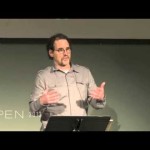We run our website the way we wished the whole internet worked: we provide high quality original content with no ads. We are funded solely by your direct support. Please consider supporting this project.

What Does It Mean that God Hardens Hearts?
Some argue that passages which speak of God hardening human hearts (Jos 11:19-20; Ex 7:3; 10:1; Rom 9:18) demonstrate that God controls everything, including people resistant to this declared intentions. He hardens whomever he wills, they argue. He could just as easily have softened their hearts, but for his own sovereign reasons he chose not to. Thus even the apparent conflict between God and Satan and rebellious humans is part of his sovereign will.
It’s difficult to reconcile the notion that God hardens people’s hearts so they won’t believe with Jesus unqualified love for the world. When we see Christ—hanging in love on the cross to reconcile us to himself—we see the Father (Jn 14:7-9). This self-sacrificial love is what God looks like. Christ is God’s “exact imprint,” his enfleshed icon (Heb 1:3). How is this revelation compatible with the frightful suggestion that God arbitrarily hardens people’s hearts to keep them from coming to him?
Moreover, how do we reconcile a God who intentionally hardens people in damnable wickedness with the biblical teaching that God “does not willing afflict, or grieve anyone” (Lam 3:33)? Can we reconcile this frightful idea with the consistent biblical teaching that God desires everyone to turn to him (1 Tim 2:3-4; 2 Pet 3:9) and that evil flows from humans’ own hearts (Matt 15:19)? There is no adequate answer to these questions. Fortunately, there is no reason to suppose that this is what these passages mean.
The root meaning of the Hebrew word translated “to harden” is “to strengthen.” God hardens people by strengthening the resolve they have formed in their own heart. For example, six times Scripture says “the Lord hardened Pharaoh’s heart” (Ex 9:12; 10:1; 10; 27; 11:10; 14:8). But it also notes that Pharaoh hardened his own heart seven times before the Lord took his action (Ex 7:13-14, 22; 8:15, 19; 32; 9:7). Similarly, centuries before God hardened the Canaanites’ hearts (see Judges 11), he had been tolerating their freely chosen wickedness and hardness toward him (see Gen 15:16). The unsurpassable love of God strives to turn humans toward himself, but there is a point when they become hopeless (Gen 6:3-8; Rom 1:24-32). At this point God’s strategy changes from trying to change them to using them in their wickedness for his own providential purposes.
God justly responds to people’s wickedness by strengthening their resolve against him. In every instance where Scripture speaks of God hardening someone, it’s an act of judgment in response to decisions these people had already made. God simply ensures that these rebels will do what their own evil hearts desire and not alter course for ulterior motives. But it’s altogether unwarranted to suppose that God unilaterally hardens people’s hearts against himself in the first place—all the while pretending to offer them the hope of salvation! When God decides to harden someone’s heart, we can be assured that God wishes it didn’t have to be that way.
—Adapted from Is God To Blame? pages 188-190
Category: Q&A
Tags: Choice, Determinism, Free Will, Is God to Blame?, Open Theism, Predestination
Topics: Interpreting Violent Pictures and Troubling Behaviors
Related Reading

Podcast: The Making of God of the Possible
Greg talks about making his book “God of the Possible,” then offers his initial thoughts on Thomas Oord’s book “God Can’t.” http://traffic.libsyn.com/askgregboyd/Episode_0468.mp3

What is the significance of Revelation 22:18?
“If anyone takes away from the words of the book of this prophecy, God will take away that person’s share in the tree of life and in the holy city…” For God to “take away” something he must have given it first. But, as with the previous verse, if God foreknew from whom he would…

Open2013 Speakers (Video)
Here’s all of the videos of the speakers and their Q&A’s from Open2013. Unfortunately, there was a mix-up and we didn’t get Jessica Kelley’s presentation taped. We’re working to get her to speak again so we can get that to you. Thanks for posting this on youtube T. C.! And now, without further ado… Greg…

How do you respond to Matthew 16:21?
“From that time on, Jesus began to show his disciples that he must go to Jerusalem and undergo great suffering at the hands of the elders and chief priests and scribes, and be killed, and on the third day be raised.” The ministry and death of Jesus are the centerpieces of God’s plan in world…

Why Can’t God? Reflections on the Oord Interview (podcast)
Greg reflects on his interview with Thomas Jay Oord. Episode 503 http://traffic.libsyn.com/askgregboyd/Episode_0503.mp3

Love and Free Will
God could have easily created a world in which nothing evil could ever happen. But this world would not have been capable of love. God could have preprogrammed agents to say loving things and to act in loving ways. He could even have preprogrammed these automatons to believe they were choosing to love. But these…
